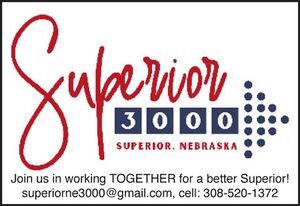Editor's notebook
June 17, 2021
Sunday afternoon, while returning from a visit with Rita’s mother at Osborne, we encountered a fireman stopping traffic on the highway south of Lebanon. Sheriff’s officers were stationed on Highway 36.
Not seeing any smoke which would have indicated the presence of a fire, I thought there must be a horrific accident over the next hill and we would have to take county roads and detour around the accident scene.
A fireman walked our way and we rolled down our vehicle’s window. He apparently read our vehicle’s license tag as he approached for he asked, “Are you headed to Nebraska?”
We said yes and he told us, “There is a big natural gas leak in this area, we don’t want anyone venturing off the road or stopping.”
As he flagged us on, it seemed our vehicle was filled with the smell of natural gas.
The odor had to be coming from our imagination as natural gas, while flowing through the large pipelines, is odorless. The distinctive odor we associate with natural gas is added to the distribution systems at what are called border stations. The border station for Superior is located on West Eighth Street.
When I lived on Blauvelt’s Hill, we had natural gas in several of the buildings but since it was odorless, we had to be extra careful and make sure our system wasn’t leaking.
While I considered it play and not work, I helped my father install the two-inch pipeline that brought gas from the main line and distributed it to his buildings.
Instead of hiring a trencher, my father plowed the line in. We made umpteen trips along the route of the line with a two-bottom plow pulled by a Ford tractor. We started in the center and rolled the dirt out with the plow. He started the pattern and then had me drive back and forth rolling the dirt out until we had a V-trench at what he thought was the proper depth for a natural gas line. I learned a lot about driving while helping with the project. I did lots of shifting, turning and lining up.
Once the pipe was installed, I used the snow blade mounted on the front of the tractor to push the dirt in and cover the line.
The covering process may have been easier for my father if he had sent me to the pasture to fight the imaginary Indians who roamed the hills in my dreams.
Frequently I didn’t stop in time and the blade dropped low and jumped out of the guides. I had to have my father’s assistance to lift the blade and put it and the lift cables back in place.
I don’t remember how many days it took to complete the project but to an 11-year-old boy, the project took years with nobody keeping order in the pasture.
I remember, or at least think I remember, emergencies associated with the gas line which delivered the popular fuel to Superior. But since I don’t associate years with the stories, I can’t go to the archives to verify them.
Once an automobile accident at the Republican River bridge caused a leak, another time a bulldozer building a terrace south of our business broke the line.
The most serious problem was associated with a Republican River flood.
Since I only remember part of that story, I’m not sure I was present for any of it. It may even have happened before I was born. My father may have told it so many times that I now think I observed at least part of it.
Like now, the line was buried beneath the Republican River, northwest of the Highway 14 bridge.
During a flood, the line came to the surface and broke. I think I remember seeing the line floating on the river but what I don’t remember, and think I should have seen, is the associated plane crash.
The highway was closed and the pipeline company was using a small airplane to ferry men and supplies across the river. The plane was taking off from the pasture south of my family’s gasoline station. One trip the plane failed to gain altitude soon enough, and the landing gear clipped the pasture fence. The plane bounced off the highway, and fortunately lifted back into the air enough to avoid slamming into the bank on the far side of the highway. What it didn’t do was gain sufficient altitude to clear the telephone line. The landing gear clipped the line, the plane flipped and landed upside down in the pasture on the far side.
The plane was repaired but another pasture take off was never attempted. Instead the highway was used.
——————
But even when stories are dated, we need to verify our facts. It seems every week we make one or more embarrassing mistakes. In the newspaper business we are supposed to print the paper’s date on each page. We had it right on 15 of the last issues 16 pages but on page one we had June 6 instead of June 10. At least the week was right.
Earlier this week, I was looking in a file drawer when I found a copy of the only Ag Student News publication that has probably ever been published by the Kansas State University College of Agriculture. Hopefully, I looked at a proof copy and not the finished product for I found several mistakes that were marked and one that wasn’t. The date on the cover page is Jan. 21, 1965. If the date is correct, I would have been a first semester freshman. I don’t think it possible for a first semester freshman to have been the newsletter’s assistant editor.
As I remember, prior to the start of the newsletter, I had been elected to the Ag Student Council and had been a guest in the home of Duane Acker, the college’s then 34-year-old director of resident instruction and assistant dean.
I don’t recall how I was selected to be a member of the newsletter staff but I received college credit for my work. In a bylined column entitled “Among Us,” (I may have lifted the title from an Express column written by the newspaper longtime owner called “Among Ourselves”) I wrote about the purpose of the newsletter and the hope it would soon become a weekly publication. I promised to post copy deadlines on the office door and to establish regular office hours the second semester.
None of that happened. The newsletter was the brain child of Dean Acker and it announced he had left Kansas State for a position at South Dakota State University. Before the first issue was distributed, the newsletter’s advisor and this assistant editor had a content disagreement with Acker’s temporary replacement. The first newsletter we produced and had printed was not distributed. There was never a second newsletter but I used the editor’s office as a private study space throughout the second semester.















Reader Comments(0)